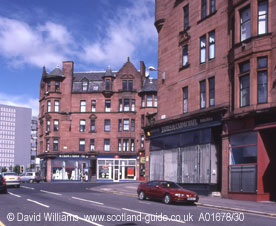The old tenements, especially those in the East End, were grossly overcrowded and an 1863 report by the city`s Medical Officer of Health reported that 64 Havannah Street is not surpassed by any close in the city for filth, misery, crime and disease; it contains 59 houses, all inhabited by a most wretched class of individuals; several of these houses do not exceed 15 feet square, yet they are forced to contain a family of sometimes six persons. Disgusting conditions like these could only be tackled by wholescale rehousing and a few years later the City Improvement Trust was given the task of dealing with the worst areas (see picture). In many ways they were very successful in their work and numerous tenements which they erected are still standing, such as in the High Street and Saltmarket.
As well as taking on the daunting task of improving the city`s housing
stock, the `city fathers` set about establishing what has sometimes been
called `municipal socialism` (although many of the most-influential councillors
were highly-successful capitalists!). As well as being responsible for
such matters as education, housing, parks and all the other local government
services we have today, at various times the council operated the public
transport system (including the trams and the Underground), the Municipal
Telephone System and they even controlled the production and distribution
of gas and electricity. Perhaps the most lauded example of how the council
worked to improve the lot of the people was the provision of a clean water
supply. This large project lasted from 1856 to 1859 and involved building
a pipeline which brought water from Loch Katrine to Glasgow; the city`s
gratitude was marked by the erection of the Stewart
Memorial Fountain in Kelvingrove Park.
In 1905 Frederic Clemson Howe, an American professor of Civic Administration,
visited the city and was quite astounded by all the municipal enterprises.
He reported that the council runs several farms upon which it uses
the street refuse as fertilizer. It has brought them to a high state of
fertility, and produces provisions for its departments. Even from this
source it has a net income of $3,000 a year. It has a wonderful system
of sewage disposal which is nearing completion. The River Clyde has always
been a foul-smelling stream, but the city is expending millions to purify
it through the destruction of its sewage and the use of the sludge as
fertilizer. The city fire department has a big workshop at the central
station where it builds all of its own apparatus, just as the tramway
department erects its own cars… Thus Glasgow looks after her people.
She is as frugal as a Scotch parent.
This article is based on the guidebook "The Glasgow Guide".
